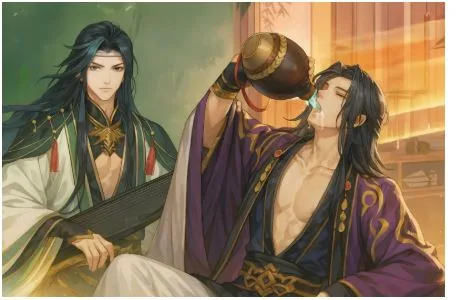The Internalized Ideal: Pain, Seclusion, and the Metaphysical Freedom of Ruan Ji and Ji Kang Part II: Ji Kang
Note: the essay is initially titled Ruan Ji and Ji Kang, The Painful Mind and the
Internalization of the Idealized World by Jiahao Shen, an independent history
Researcher from Postgraduate program of World History and Philosophy at
King’s College London. The Chinese characters in the original essay have been
omitted for editorial purpose, and the quotations of the historical sources have
been abridged significantly. Due to the considerable length of the original essay,
the essay is divided into the two parts with the shared introduction and
conclusion.
The period of Ruan Ji and Ji Kang, the two idealized yet painful philosophers in the early Medieval China, witnessed the initial consolidation of the centralized power on the Northern China that embodied with the preliminary restoration of the relations with the transforming aristocracy class. But tragically the subsequent imposition of the highly suffocating and oppressive political environment from the de-facto ruling of Sima family inflicted the profound internal despairs and depressions to the aristocracy intellectuals, and particularly to the group of intellectuals that devotedly aligned and embraced themselves to the forming ideological and philosophical system of metaphysical pure and original natural order.
Therefore, for the group of aristocracy intellectual that exemplified by the Ruan Ji and the Ji Kang, in their intellectual and spiritual realm, utterly resisted to accept and involve into the miserable condition of suppressing political authority. And accordingly with their imposed intensively painful mind, to further radically advance their pursuits and devotions for wholly assimilating the self, the spirit and the identity, to be the integral and eternal part of the pure natural order.
However, in the tragic irony, such system of oppression could not be truly escaped, and the brutal reality of such inescapability forced the aristocracy intellectuals to interact and compromise with the growing suppressing political authority in the considerable extents. The inevitable struggles and tensions between the two worlds, the external world of coercion and oppression, and the internal world of pure idealism, became the fundamental and irreconcilable source of intellectual and spiritual torment, and consequently led to the ultimate tragedy of the fate for the two eminent intellectuals but with the enduring preservation of their spiritual freedom and intellectual mind of idealized world that essentially transcend the boundary of any particular historical era and civilizational sphere.
The aristocracy class had consolidated the initial formation during the extended Han period by being transformed to be the centralized scholar-elites from the diverse origins and by meanwhile strengthening the regional powers and authorities through the centralization progress. The confrontation of the severe oppressions from the centralized imperial authority and relevantly the divisions inside the aristocracy class on the fervent conflicts between the pursuit of Confucian moral idealism and the escalating corrupted power abuse, compelled the communities of aristocracy scholar-elites who firmly upheld the Confucian idealism to retreat from the active political sphere. The retreat greatly deepened the self-conception of pride and dignity of the idealized aristocracy communities, and their independent and distinct identity as the aristocracy class. The complete and disastrous collapse of the Han empire further contributed to the reinforcement of the independent power and identity of the aristocracy class. The relation between the aristocracy class and state was reconfirmed and reestablished through the systematic development of the philosophical system under the time of incomplete but functional political restoration, which the philosophical system metaphysically conceptualized the ultimate natural order that defines the fundamental principles and mechanism of governing the all things in the practical world, and thus completely mandates the tranquility and harmony of all conduct of actions in full compliance with the ultimate natural order.
For the Ji Kang, to the certain extent, he was less painful than the Ruan Ji as he tended to be more of a idealist by nature for the pursuit of the philosophical life of seclusion.
From the beginning of the Ji Kang’s formative thoughts, he did not seek the building of the relationships and engagements with the external realities that particularly with the political world. The full dedication was given to merge the self-spirit to the oneness and universality of the world of metaphysical nature.
The single-minded immersion and devotion to the idealized metaphysical nature, for the Ji Kang, did not come directly from the experience of struggles with the political oppression. In truth, the philosophical construction of the idealized metaphysical nature without the explicit empirical interaction could be viewed as the more pure form of the inner idealism. Certainly the general cultural pattern on the strong propensity toward the independent mind state of the aristocracy class played the crucial role. Under the broader cultural context, Ji Kang developed and arrived at his own world of idealist nature chiefly through the pure reasoning, the transcendent experience beyond the empirical world that directly from the deep consciousness from the inherent nature. That philosophical progress had made him a pure secluded idealist as the progress on the pure ideas of metaphysical nature was initially without the struggles with the external system in general.
Thus under the coming of the age of political oppression, from his idealist pureness, Ji Kang actually displayed the remarkable indignation and resistance more than the inner pains.
Ji Kang draw from ancient historical source on the founding era of the Zhou Dynasty, which the core ideas of Confucianism rooted from. In the traditional historical judgement, the rebellions of two lords after the death of the founding king were consensusly denounced as the total betrayal of the royal and moral virtues. The Ji Kang, however, purposefully sympathized the two rebelled lords by recognizing their genuine intentions on protecting the state in the period of potential political instability, but only committing the wrong practice due to the misunderstanding of the Sage’s meanings. Their morality remained intact and pure, and so as the regent ruler at that time who suppressed the rebellion and executed the two lords. Both sides fulfilled their missions and fate that purely based on their sincere intentions and minds.
The mentioned lord rebellions at the ancient time indeed stood as the metaphorical reference to the failed but significant local military revolt against the actual ruling of the Sima family. Ji Kang fully recognized their moral integrity that based on his fundamental belief that the authentic morality could only derive from the true inner nature not the outside secular judgement. Also at that time, Ji Kang recognized the legitimacy of suppression from the Sima ruler as well, which was also on basis of the belief their actions did come from the authentic conscience.
They have set up the Six Classics as their standard, looked up to benevolence and righteousness as their guiding principles, taken rules and measures for their chariots and steeds, and instruction and discourse as their nourishment. If one follows their path, he is said to reach enlightenment; if he strays from their way, he is deemed obstructed. They roam in thought and gaze to their utmost, yet see nothing beyond these bounds. All their lives they gallop and race within that pen, their minds never venturing from the prescribed track. Gathered in clans, they offer opinions— for them, learning alone is held as noble. They clutch the books and parse the sentences, bending and raising their heads with sighs and admiration, pressing the words to their bosoms as ornaments of glory and success. They said: “The Six Classics are the sun itself; to be without study is but eternal night.” But if one were now to take the Hall of Enlightenment as a burning house, recitation as the speech of ghosts, the Six Classics as weeds and brambles, and benevolence and righteousness as rotting carrion— then, at the sight of written scrolls, his eyes would turn askance; at gestures of ceremony and bowing, his frame would grow contorted; in donning the robes of office, his muscles would twist; and at the mention of rites and statutes, his teeth would ache. Should he then cast all these aside together, and make a new beginning with the ten thousand things, even though he be tireless in his love of learning, he would still fall short of the mark. Thus it may be said: what was once called ignorance is not necessarily endless night, and what is called the Six Classics is not necessarily the sun.
The belief onto the Sima’s ruling proved to be short-lived. As the Sima’s ruling proceeded to be more established, Ji Kang clearly demonstrated his stance of anger and defiance toward the current harsh situation of political oppression. The aggressive critics and denouncement on the Confucian classics was presented openly and blatantly. It is not unexpected for Ji Kang to completely negate the superficial and hypocritical values of the Confucianism-in-practice. His understanding of the true values and freedom was exclusively and purely from the original nature that essentially transcending any practical experience. The establishment of the Confucian classics that contrivedly centralized and integrated all the universal moral values would only cause itself to completely lose the universality and authenticity, and correspondingly forced the people inside that established system to be completely deprived the true self without even being conscious. And thus the total Confucian system in its reality stood as the total betrayal of the true nature. Ji Kang’s unconcealed harsh statement onto the Confucian classics was the truthful representation of his intense angers toward the continuously deteriorating system of oppression.
Ji Kang further proceeded to bluntly criticize and warn the high possibility of the total collapse of the state if the current atmosphere and condition of political oppression continued to be degenerated, and thus forced the people inside keep morally and mindfully alienating themselves from the true self and true nature that would only eventually lead to the complete destruction of the self that along with the state.
Shall I rather speak forth in anger, laying bare my sincerity, uttering words of rectitude before the imperial court, refusing to bow to princes and lords? Or shall I abase myself in weakness and compliance, fawning upon command, to become one who flatters with his face and serves with his tongue? Shall I be gentle and broad in kindness, bestowing favor without seeking its return? Or shall I chase after worldly gain, yielding and conniving for hollow accord? Shall I live in seclusion and walk in righteousness, pursuing the utmost sincerity? Or shall I exalt false show and cunning deceit, nourishing a hollow name? Shall I cast out the wicked and flatterer, hold firm to uprightness and never bend, judging clearly what is worthy and what is base? Or shall I act with mocking arrogance and slippery wit, grasping at cleverness and relying on artifice, becoming a mere bag of tricks? Shall I hide my scales and colors, like the dragon concealed in the deep? Or shall I spread my wings and cry aloud, like the swan soaring through the clouds? Shall I transform my form outwardly while concealing my heart within, bending my body to suit the times, sinking nameless beneath the world’s surface— dwelling among men, yet truly abiding in the dark? Or shall I rouse myself in proud clarity, sharpening my thought to brilliance, walk apart from the world yet keep my heart with the crowd, so that wherever I go, my name is known, my days consumed in restless striving? Shall I live spare and free, with nothing to boast or claim, making no distinction of self and others, content in peace, neither contending nor yielding, wandering with a pure and shining mind until I sit in sudden forgetfulness— seeking to follow Fu Xi and Shen Nong, yet falling short, walking the Middle Way, yet sorrowing still? Or shall I stir my heart to valiant feeling, exalting passion as brightness, pressing upward to defy the throne of ten thousand chariots, and downward to challenge the ministers of state, holding my countenance in proud restraint, raising myself high in self-assertion, forever as one who has lost his post, nursing resentment and bitter regret? Shall I amass a thousand millions in treasure, strike the bells and dine from tripods, recline among fragrance and delicate beauty? Or shall I toil and exhaust my strength, clearing away the thorns and briars, dwelling in the mountains, drinking from the valleys, and resting by the cliffs?
Under the severe environment of political oppression, even the mind of the pure idealist as the Ji Kang could not be able to escape the huge inner pains being inflicted to him. Within the deep exploration and inquiry into his idealized inner nature, he asked himself critically on the choice between the submission to the oppressive political authority and persistence of his secluded idealism, and between the acceptance of the self-corruption and self-alienation to be absorbed fully into the utilitarian external world and the preservation of the idealized self in the inner idealized metaphysical world.
These were, actually not the real questions, but his fervent outrages and frustrations toward the ongoing cruel and dark reality.
And the true response was constantly crystal and firm. Ji Kang as the true idealist from the metaphysical inner self, would never make any kind of compromise and submission to the distorted and disordered world.
Such utterly uncompromising mind culminated into the event when Ji Kang was invited to accept the attractive official position under the Sima’s ruling. Ji Kang declined the opportunity, which in fact such invitation could be defined as the moral insult to himself, in the tragically heroic spirit.
Moreover, I often denounces Tang and Wu, and speaks lightly of Zhou and Confucius. In the world, such words cannot long remain hidden; once made known, they offend the teachings of the age — this is the first of the two things most intolerable. My nature being firm and my heart swift to hate evil, I speak my mind freely and without restraint; when events arise, my words are fierce and sudden —this is the second of the two things most intolerable. ..If outward disaster does not befall him, inward sickness surely will. How, then, could he long remain in the world of men?
In Ji Kang’s open statement of refusal, he fearlessly and candidly presented his denouncement of the Tang Wu, King Wen of Zhou and the Confucius, the three undisputed great sages at the ancient time that under the established Confucian ideology.
The Tang Wu launched the political revolution on establishing the initially well-organized state, the King Wen of Zhou unprecedentedly established the system of moral rituals and orders, and the Confucius built the original form of the Confucianism as the compelling moral and political ideology. The direct confrontation and complete denial of the three sages clearly and fully revealed Ji Kang’s ultimate refusal of the inherently corrupted external reality with his ultimate determination on preserving the inner idealized self and relevantly the freedom of mind, and it was completed in his own distinctively honest and courageous way.
Ji Kang’s direct denouncement toward the Confucian sages eventually led to the imposition of the death to him, which he maintained the mindful tranquility even right before the execution.
The period of political oppression actually ended shortly. Accompained with the consolidation of the political power and the final ascension of the Sima family to the emperorship, the relation-building between the aristocracy class and imperial authority was back onto the trajectory. The distinctive and exclusive status of the aristocracy class, for both their political and social privileges, and the unique identity, were continued to be ensured and strengthened. And reciprocally, the philosophical system on the ultimate natural order evolved to expand the concept of nature with the inclusion of the utilitarian material world into it to conclude the complete unity.
At the mean time, the strong mind of seclusion and freedom from the Ruan Ji and Ji Kang, continued to inspire the aristocracy class in the following generations, which the life and thought style did indeed highly match with their distinctive status. Unfortunately only the superficial forms were being imitated. For the Ruan Ji and Ji Kang, their deep pursuit of the internalized transcendent nature and the idealized spiritual self that constantly attached with it, and correspondingly the intense painfulness and struggles toward the external world with its systematic structure, were hardly being truly understood and sympathized.
The inherent predicament on the internal idealized world and the external alienated world critically goes far beyond any particular period, and it is intensely present to the current moment for anyone with the relevant intellectual consciousness. And the spirit of the Ruan Ji and Ji Kang, their pains and their idealism, persistently stand as the spiritual remedy and echo.




